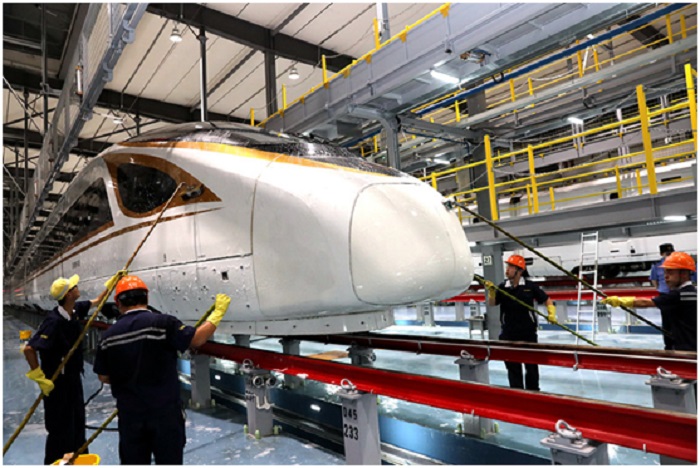



By Du Haitao, People’s Daily
China’s manufacturing Purchasing Managers’ Index (PMI) for June stood at 50.9 percent, up 0.3 percentage points from May, according to data jointly released on June 30 by the National Bureau of Statistics (NBS) and the China Federation of Logistics and Purchasing (CFLP).
The figure has been kept above 50 percent for four consecutive months, indicating that the country’s economic recovery continued to gain momentum with constantly enhanced stability of industrial chains.
Among the 13 sub-indices, those for production, new orders, new export orders, existing orders, purchase quantity, import, purchase price, producer price, and raw materials inventory rose 0.3 to 7.3 percentage points from the previous month in June, while the sub-index for supplier delivery time remained unchanged over the previous month.
Besides, sub-indices for finished goods inventory, employee, and production and business activities expectation dropped 0.3 to 0.5 percentage points from May.
The slight rise in the PMI in June above the 50-point mark which indicates economic expansion showed that China has accelerated its economic recovery, according to Zhang Liqun, a researcher with the Development Research Center of the State Council.
A series of policies have been implemented after the annual sessions of China’s top legislature and political advisory body in May to keep employment, the financial sector, foreign trade, foreign and domestic investments, and expectations stable and ensure security in job, basic living needs, operations of market entities, food and energy security, stable industrial and supply chains, and the normal functioning of primary-level governments, Zhang noted.
Together with the previous policies rolled out to promote work and production resumption, these macro policies delivered more visible results, Zhang added.
Fiscal and monetary policies’ role in expanding domestic demand should be strengthened to further sustain the positive momentum of economic recovery.
China saw a recovery of market demand in general and growing driving forces for economic development. The country’s economy continued to recover with stable growth in consumer last month.
Sub-index for new orders stood at 51.4 percent, up 0.5 percentage points from May, while that for new export orders grew 7.3 percentage points from the previous month to 42.6 percent, with the decline in export significantly narrowing.
The recovery of market demand will further drive economic growth and business operation.
Production activities of enterprise rebounded, leading to an increase in raw material purchases. In June, sub-index for production was 53.9 percent, up 0.7 percentage points from the previous month and maintained above 53 percent for four months in a row.
More production activities drove enterprises’ demand for upstream products in the industrial chain. As a result, the purchase of raw materials increased accordingly, and the sub-index for purchase quantity rose 1 percentage point from May to 51.8 percent.
Meanwhile, prices in the whole sector picked up in a more coordinated way. Last month, driven by the rapid growth of enterprises’ purchase quantity, prices of basic upstream raw materials continued to rise on the basis of the previous month. The sub-index for purchase price grew 5.2 percentage points from May to 56.8 percent, while that for producer price rose 3.7 percentage points from the previous month to 52.4 percent, exceeding the 50-point mark for the first time this year.
The PMI indicated that the Chinese economy recovered gradually from March after some fluctuations early this year due to the COVID-19 epidemic, said Wen Tao, an analyst with the China Logistics Information Center.
In Q2, both the production and market demand saw a rapid recovery. The average sub-indices for production and new orders were 53.6 percent and 50.8 percent, respectively, which were above the 50-point mark and higher than that of Q1 and the same period last year.
Besides, purchasing activities and employment recovered significantly in Q2, with index readings higher than that of Q1 and the same period last year.
By the end of the first half of this year, China’s economic recovery continued to gain momentum with continuously enhanced stability of industrial chains, laying the foundation for a stable start in the second half of the year.
The non-manufacturing PMI, also released by the NBS and CFLP on June 30, edged up 0.8 percentage points from May to 55.4 percent in June. Except for non-manufacturing PMI sub-indices for supplier delivery time and for production and business activities expectation, which were down 0.8 percentage points and 3.6 percentage points, respectively, other sub-indices all grew 0.1 to 2.0 percentage points from May.
Cai Jin, CFLP vice president, said China’s non-manufacturing PMI has been picking up on a month-on-month basis since Q2, indicating a good recovery momentum of the non-manufacturing sector.
Changes in the sub-indices for non-manufacturing PMI showed that China saw a sound momentum for steady economic recovery as most industries recovered growth. In the second half of this year, the country needs to promote economic transformation, expand domestic demand and strengthen the endogenous dynamism of economic recovery to ensure continuous and sound economic growth.


The Humanitarian Service Diamond Awards has.
A Chinese Company, Inner Galaxy Steel.


The Programme Coordinator, Regulatory, Compliance and.


A Non-Governmental Organization (NGO), Committee for.
The Trustfund Pensions Limited has chided.


The House of Representatives Committee on.
The China General Chamber of Commerce.


Senator Chuka Utazi who represented Enugu.


An Abuja based Legal Practitioner, Ugochukwu.


The African business community in Yiwu,.
Leave a Comment